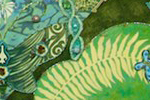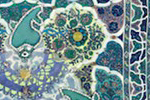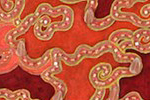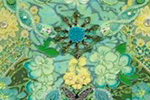Summer 2015: Prose
Concentric
Fiction by Susan DeFreitas
The gathering wave of her last days — when it hit, it seemed the blow I’d been bracing for all my life. So much remained unsaid that it seemed inappropriate to speak. But it wasn’t exactly grief I felt in the months that followed my mother’s death. Or, at least, it was not my idea of grief.
I found myself staring out of classroom windows, tracing shadows, dipping a finger in my coffee cup just to watch the ripples respond. Colleagues posed questions in private, but I, for once, had no idea — no premise, no logic, and no conclusion.
Just a feeling like I’d been holding my breath, and just then, at that moment, exhaled.
Each day delivers some fresh disaster: an oil train derailed; a colony collapsed; another young black man shot. It seems as if the young are an increasingly endangered species, and so many have already been lost. I haven’t seen a monarch butterfly since junior high, when I spent my small-town summers in the backyard tanning. Can you imagine?
And still there is the beauty of this silence.
No one understands this, and maybe no one ever will, but I quit teaching in order to pay attention. Because for the first time since I was old enough to understand what we were doing to the weather — for the first time since I read Silent Spring — for the first time, maybe, since I watched the Challenger shuttle explode in my third-grade classroom, I’ve begun to suspect that maybe nothing’s gone as far off course as we thought.
The sun rises over the lake while I eat my breakfast, and I could swear it was the same configuration of corn flakes floating in milk in my bowl as leaves on the lake outside my window. A certain shape suggested — like a tree leaning one way or a snake with a broken tail. The shape of random things drawn, imperfectly, into some perfect spiral.
What was it Bertrand Russell said about philosophy? That it should dissipate certainty. And yet, until that wave broke, I had spent my life in a state of such skepticism, certain of my uncertainty.
The world is more than we have imagined, larger. Its beauty will survive us. But when we pass from this earth, will we have seen it?
Will we have heard what it had to say?
Our kitchen is filled with windows and things that fill them: cobalt blue glassware and stained glass stars, hanging plants and prisms and pots. My husband and I have collected these items from all over the world, memories bound to form — yet when the sun rises over the lake and sunlight fills the kitchen, the space within it feels empty.
Yesterday, as I watched the sun rise, I caught a faint rhythm, distant but familiar. After some time, it occurred to me it was my heart. I noted a faint, faltering break in this rhythm. Tiny but distinct variations. Slight hesitations. What doctors call fibrillation.
Did I relate this experience to Lee?
I did not.
Or, rather, I tried, but could not.
My husband suggested I schedule an appointment with Dr. Lessens: maybe it’s a heart condition, he said. I tried to explain the studies I’d come across, years ago, in my research on resilience — that the heartbeat prone to such slight variations is significantly less prone to failure or attack.
Good, he said, glad to hear it, but I could hear the anxiety in his voice. Like everyone else, he’s wondering how long I intend to extend the leave of absence I’ve taken, though it’s not a matter of money.
What can I say?
I don’t know.
I clear the breakfast dishes, my bowl and his cup, the morning spirals down the drain. The house is quiet and rhythmic, like the inside of my body, and when I shut the tap, it drips. But I have nowhere to go and nothing to do, so instead of tightening it down, I stand there in my slippers, listening to the drip of the tap and the crick of a cricket somewhere in the house. The regular intervals, after a time, give way to a pattern more complex. And eventually there is some correlation between the two, slight but undeniable.
The drip of the tap is pure determinism — a small but steady leak. But the pattern it gives rise to never quite repeats; chaos theory in practice, here at the kitchen sink. The cricket can’t hear what I hear, can’t sense those fluctuations, and yet it seems to be talking back to the tap — these random things coalescing intermittently into a kind of order.
When I look up, the sun has cleared the trees.
It has been a good year. I have swept clear the corners of this old house and left the bed unmade; like a child, I have blown the puffs from the dandelions in the backyard, filling the lawn with a snow of seeds. My husband has been patient through all of this, though I suppose what he says is true. My behavior since my mother’s passing has proven inexplicable.
Then again, so has the laundry.
I have a white dress made of white linen, a gift from my mother, which she found in France. She told me that the clouds in the countryside there moved like turbulent water, but slower; I thought of the creek that feeds the lake beside our house and immediately, I could see it, that fluid unfurling. The way patterns repeat at different scales.
This dress moves like the leaves on the willow beside the lake when I walk, and when I do, she’s with me again, in the immense fields of lavender she described before she died.
There are no arguments between us then, no struggle — religious, reproductive, or otherwise.
Just the smile on her face when the words became too dear.
The trouble with white linen is how easily it stains — last week I spilled some coffee on it, and no matter how many times I treat the fabric, the stain won’t wash away. When I wash it again, mixed in among socks and briefs and sheets, it emerges once again with that spot. It is a shadow of a spot, really, but unmistakable once you know it’s there, buried deep within the thread.
Strange, how this distresses me, standing here in the laundry room. It’s just a dress, after all. No item of clothing, no matter how carefully cared for, lasts forever.
And it’s then I notice something strange. On a one-inch section of linen beside the coffee stain, there is another brown spot, so tiny it is almost unreal. My eyes move slowly over the fabric, and sure enough: on every square inch of the entire dress, there is one tiny brown spot. No more than a natural variation, a feature of the unbleached fabric, but still, a tiny, distinct shape. A miniature of the whole.
Lee, I say, I want you to look at something.
My husband looks up from dinner, tired around the eyes. I don’t have the heart then to show him the dress, which I’ve left folded carefully on the back of the sofa. Because showing it to him would only worry him. I can see that now, though it bothers me. That I cannot speak of the things I see.
I start and stop and start again, and finally I say, Do you ever think about patterns in nature?
Only once or twice a day, he says. When Lee smiles he looks like his father, who looks like a grown-up camp counselor.
I press him: Really, though. The Fibonacci sequence, the golden mean, and all that.
He lifts a hand. As if to say, what about all that?
I ask if he ever wonders what it might mean, that they exist — that these patterns are so ubiquitous.
He says my name. He says, Jean, I’m wrapped up in neuroses all day. Daddy issues. Mangled marriages. Bad dreams. It’s your job to think about things like that. You’re the philosophy professor.
And here I want to correct him. To point out that a philosophy professor is what I used to be — now I am simply a propagator of dandelions, an investigator of laundry.
Though it’s true that I have thought about what things might mean since I was small — wondering which came first, the chicken or the egg, or whether there was a time when time began and whether there will be an actual end — I cannot explain this to my understanding husband, cannot make him understand. That this is not just some kind of sabbatical, a merely academic leave. I have not been working on a book this year, meditating on the biases in Kant’s rants. I have no thoughts this time, no theories or conclusions. There is simply some acute perception within me finding form.
I tell him that sometimes I think about how all the information for the each of us is contained in every cell — a microcosm of the whole. All this essential information, passed down the line. All these bits and pieces of other people. People who are gone now. People we’ll never know. In a way, we’re all of them.
Lee considers me steadily. My husband is a psychiatrist, and a good one; his patients genuinely love him. I genuinely love him, too, and I know that he blames Mom’s death for this break they say I have suffered, this break I have taken.
Does he understand what I am trying to say? Do I?
For a long time, when I thought of children, I thought of the population bomb, the atomic bomb, and all those endocrine disrupters recovered from umbilical blood.
Now, all the words I once used to explain such things are gone.
All that’s left is the kindness of the silence between us.
When I pour the cream into my coffee, light folds itself, liquid, into dark. I think of my mother and her turbulent clouds. I think of the lines in her cheeks, the webwork and branches of wrinkles. Lee is gone again to work, and I am alone in this kitchen, full of the glittering things of our lives. All these treasures we’ve collected — one by one they’ll crack, break, become misplaced: the pewter saltshakers from Israel, the stained-glass mosaic from Nepal. For a long moment I sit here, smoothing the skin over the back of one hand, watching the blue veins there, flowing with the blood of my irregular heart. It’s the shape of the trees when the leaves are gone.
When I walk into the backyard with my coffee, the dandelions are humming with bees. Bees! Their colonies here intact, not yet collapsed. Each yellow flower a million intricate strands, pushing outward from an ultimately invisible center, holding within it a million more.
I pick their white balloons and blow; individual seedpuffs, one by one, let go. They separate from one another, driven by slightly different vectors in a breeze that, to me, is almost imperceptible, but each and every one of them knows just where to go. Where each will land is ultimately random, and yet, when they settle, it seems there’s a kind of pattern to it — like a tree leaning one way or a snake with a broken tail.
I settle my coffee in the grass and drop my robe, then hit the dock at a run. And though there’s no preparing for it — this change I’ve set in motion — I’m amazed at the way it hits me, the way I hit it, sinking down into darkness. All sounds around me softly muted. For one long, wordless moment I live here, immersed in the body of another.
Then my head breaks the surface, and the sky blooms above me as I float. It’s full of the kind of cumulus clouds my mother described before she died. And I can feel this wild seed within me, its expression as yet unknown — a living pattern, of which I am a part.
| |

|

|
 |
 |
 |
 |
 |
||||
|
As hot as the summer sun, 13 poets breathe light into the darkness. |
Tending to the worn, imperfect edges of life, five writers grapple with perimeters. |
Like a swarm of bees or a flock of birds: four artists layer meaning through detail. |
Four teens observe their world and put words to page like only young voices can. |
From emerging to established writers – meet the women behind our seventh issue’s voices and visions. |

